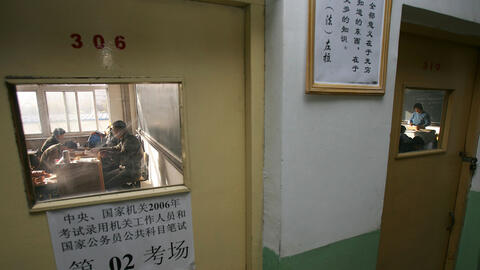APARC Research - Institutional Foundations of the Chinese Bureaucratic State

The Institutional Foundations of the Chinese Bureaucratic State
Research Focus
State bureaucracy has had a long history in China, but the bureaucratic state that has emerged over the last thirty years of China’s great transformation has been noticeably different from its predecessors. Compared with traditional Chinese bureaucracies or even those in the Mao era, the contemporary bureaucratic state has been more elaborate in rules and regulations that govern bureaucratic behaviors, promotion, and mobility, and in the significant expansion of bureaucratic power in different arenas of social and economic life.
Resource allocation and personnel management are two pillars of the authoritarian state, but the latter has not been closely studied in economics and political science literature and, in the case of the Chinese state, information about the processes of personnel management is particularly scant due to the difficulty to access the Chinese bureaucracy. We therefore know little about the internal operation of China’s bureaucratic state and, as a result, important questions remain unanswered, such as: How does the state incentivize officials in the pursuit of its goals? How is bureaucrats’ career mobility affected by their performance or network ties? How are different agencies, bureaus, and offices interconnected?
Integrating a comprehensive analysis of elite mobility in the Chinese bureaucracy over more than two decades of the economic reform, on the one hand, with an ethnographic study of rural governance in China, on the other hand, The Institutional Foundations of the Chinese Bureaucratic State research project addresses these questions. It aims to provide in-depth understanding of the institutional foundations of the Chinese bureaucratic state and, in turn, shed light on its role in international relations and on the global stage. This is a collaborative research project that involves Stanford undergraduate and graduate students, as well as scholars at several Chinese institutions (Peking University, the People University of China, and Nanjing University).
The first line of research examines patterns of career mobility among bureaucrats in the Jiangsu Province in its entirety from 1990 to 2016, while China experienced rapid economic growth. It draws on a large dataset of more 50,000 officials and more than 400,000 records of career histories detailing their moves from lower to higher levels of the bureaucratic ladder. This is the most complete dataset of bureaucrats and their career mobility in a large bureaucracy that governs China’s economy. In fact, with a population of 77 million, Jiangsu Province has the second largest economy in China, just behind Shanghai.
The systematic analysis of career mobility data, together with regional economic data, will help empirically adjudicate between two competing arguments in the debate among China scholars regarding top leaders’ criterion for career promotion—whether economic growth or sponsored mobility. The outcomes, in turn, will help us better understand the Chinese bureaucracy’s incentives for economic growth and its role in China’s economic transformation. Moreover, by systematically tracking career mobility of bureaucrats we can unearth the internal structure of the Chinese bureaucracy; the interrelationships among different bureaus, agencies, and offices.
The second line of research draws on close observation of bureaucratic behaviors in select government offices in Jiangsu Province, focusing on the daily activities of local officials and the implications of these activities for the emerging institutions of governance in rural areas. This ethnographic study of personnel management practices will help better understand human resource allocation, especially cadre mobility, and their implications for economic development.
Xueguang Zhou
Publications
The Logic of Governance in China: An Organizational Approach.
Forthcoming, Cambridge University Press
Bureaucrats, Local Elites, and Economic Developments: Evidence from Chinese Counties
with Ling Zhu, chapter in Economies, Institutions, and Territories: Dissecting Nexuses in a Changing World, edited by Luca Storti, Giulia Urso, and Neil Reid, Routledge, August 2022
Chinese Bureaucracy Through Three Lenses: Weberian, Confucian, and Marchian
Management and Organization Review, July 2021
Management and Organization Review 16:3, June 2020
The China Journal no. 84, July 2020.

